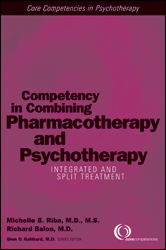|
|
|
| |
 |
|
|

|
-
推薦指數:



|
|
- 內容介紹
|
Competency in Combining Pharmacotherapy and Psychotherapy: Integrated and Split Treatment
by Riba, Michelle B. ; Balon, Richard
1585621439
Edition 1 , 2005 , AMERICAN PSYCHIATRIC PUBLISHING INC
This essential work provides the ideal text for psychiatry residents who need to develop and demonstrate competency in providing psychotherapy and pharmacotherapy in both integrated and split approaches—a competency required by the Residency Review Committee in Psychiatry.
Clinically and developmentally oriented, Competency in Combining Pharmacotherapy and Psychotherapy: Integrated and Split Treatment focuses on competencies in adult psychiatry in the outpatient setting. The authors detail guidelines for assessing residents' competency to provide both integrated treatment (delivered by one professional) and split treatment (delivered in collaboration by two or more professionals). They present these guidelines in two main standalone sections, which can and should be read separately. Both sections deal with similar problems and thus contain similar information, such as selection of medication and psychotherapy, evaluation and opening, sequencing and maintenance, and termination of integrated and split treatments.
Today, the combination of pharmacotherapy and psychotherapy is the most widely used treatment modality for a broad range of psychiatric disorders. Many clinicians believe that it is also far more efficacious and beneficial than either modality used alone. This volume ably addresses some of the more complicated aspects of combining treatments, such as how patient presentation affects pharmacotherapy and psychotherapy, the timing and staging of combined treatment, which therapies should be used in combination with pharmacotherapy, and which professionals should be included in split treatment.
This eminently practical volume will be welcomed by residents and training directors alike as an integral part of all psychiatric residency training programs, and will also be useful to nurse practitioners, physician assistants, social workers, and psychologists.
|
|
|

